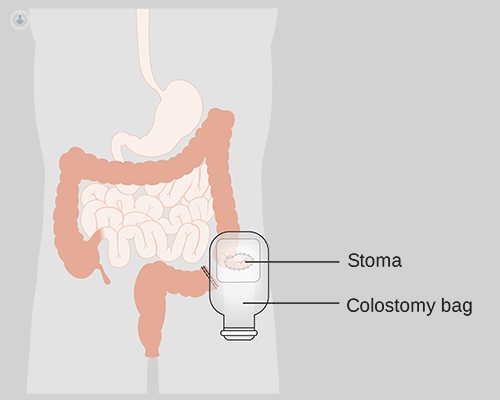What is a colostomy and what is it like living with a stoma bag?
Written by:Colostomy formation is a surgical procedure in which part of the colon is diverted to connect with an opening on the tummy. These can either be temporary or permanent, depending on the underlying cause. Mr Gordon Neil Buchanan, a leading colorectal surgeon, sheds some light on what a colostomy entails, and what living with a stoma bag is like.

What is a colostomy?
A colostomy is a surgically created connection of the colon to the skin where the bowel has been brought up through the abdominal wall. They can either be loop or end colostomies. Therefore, when a patient has a colostomy, faecal content that would normally pass through their bowel and exits through the anus, instead will go through the colostomy opening which is situated on the abdominal wall and enter into a colostomy bag which is stuck on to the abdominal wall by adhesive.
When would a colostomy be recommended?
The commonest type of colostomy created would be a permanent colostomy following low rectal or anal cancer surgery where the rectum and anus need to be removed in order to ensure that all of the cancer can be safely removed.
Other circumstances where a colostomy would be created include potentially temporary end colostomies, for example, when emergency colonic or rectal surgery is undertaken for a perforated bowel which can be caused by conditions like diverticular disease.
Loop colostomies are also used to divert the faeces away from infected areas, such as a fistula or where the bowel is blocked or obstructed further downstream, or where patients have severe incontinence or where they may need chemotherapy or radiotherapy prior to further anorectal cancer treatments.
What is recovery like after having a colostomy?
Recovery after having a colostomy procedure in hospital may be short if the operation is planned and carried out laparoscopically. Recovery usually entails the patient getting used to managing a colostomy bag with the assistance of skilled stoma nurse.
However, if surgery is an emergency case or major cancer surgery, then recovery in hospital can take several weeks, depending on the extent of the operation.
In all of these circumstances, patients and their carers are trained how to manage with a colostomy bag by specially trained stoma therapists.
What lifestyle changes need to be made after having a colostomy?
The lifestyle changes that come after having a colostomy created can be minimal in some cases. This is exemplified by the fact that there are a number of quite prominent figures in public life who live with a colostomy, yet this is not obvious to those observing them.
However, specific changes to diet and managing life with a colostomy bag whilst travelling, working or undertaking sports or activities can be tailored to the patients’ requirements with the assistance of stoma therapists.
What is the best advice you have for people living with a colostomy bag?
A colostomy will have been formed for a very good reason and it is essential to maintain close contact with stoma therapists and the surgical team who have performed this operation. The underlying condition which created the need for a stoma bag will need to be treated.
Some colostomy bags are potentially temporary, as outlined above, and again correct protocols will need to be followed to determine the optimum timing for reversing colostomies if this is possible. For patients with a permanent or temporary colostomy, there is the Colostomy Association who can provide additional support and advice. Stoma companies are continually updating equipment which can, in turn, improve the quality of life of patients living with a colostomy.
If you like to learn more, make an appointment with a specialist.


